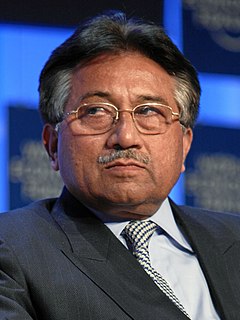| |||||
| Centuries: | |||||
|---|---|---|---|---|---|
| Decades: | |||||
| See also: | Other events of 2001 List of years in Pakistan | ||||
Events from the year 2001 in Pakistan.
| |||||
| Centuries: | |||||
|---|---|---|---|---|---|
| Decades: | |||||
| See also: | Other events of 2001 List of years in Pakistan | ||||
Events from the year 2001 in Pakistan.
President Musharraf meets Indian PM Vajpayee in Agra for a three-day summit; the talks fail. [1]
| | This section is empty. You can help by adding to it. (May 2013) |

Pervez Musharraf is a Pakistani politician and a retired four-star general who became the tenth president of Pakistan after the successful military takeover of the federal government in 1999. He held the presidency from 2001 until 2008, when he tendered his resignation to avoid impeachment.
Pakistan experienced unprecedented economic growth during FY 2004. Its large-scale manufacturing sector grew at a rate of over 18%. Hard-currency reserves, having grown phenomenally in recent years, reached record levels. GDP growth reached 8.4% in the twelve months ending June 30, 2004. Pakistan's stock market has been one of the best-performing stock markets this century, as of 2005. The government's credit rating was upgraded by Moody's and Standard & Poor's. Pakistan announced that it no longer needed International Monetary Fund (IMF) assistance. The government's economic reforms were praised highly by supranational institutions such as the World Bank, IMF and the Asian Development Bank.

Muhammad Rafiq Tarar is a Pakistani politician and a jurist who served as the ninth president of Pakistan from January 1998 until his resignation in June 2001, and prior to that as a senator from Punjab in 1997. Before entering politics, Tarar served as senior justice of the Supreme Court of Pakistan from 1991 to 1994 and as the 28th Chief Justice of Lahore High Court from 1989 to 1991.

This is a timeline of Pakistani history, comprising important legal and territorial changes and political events in today's Pakistan and its predecessor states. To read about the background of these events, see History of Pakistan and History of the Islamic Republic of Pakistan. See also the list of Presidents of Pakistan, the list of Prime Ministers of Pakistan and the list of years in Pakistan.
The 2001–2002 India–Pakistan standoff was a military standoff between India and Pakistan that resulted in the massing of troops on both sides of the border and along the Line of Control (LoC) in the region of Kashmir. This was the second major military standoff between India and Pakistan following the successful detonation of nuclear devices by both countries in 1998, the first being the Kargil War of 1999.
Events in the year 1990 in Pakistan.

A state of emergency was declared by President of Pakistan Pervez Musharraf on 3 November 2007 and lasted until 15 December 2007, during which the constitution of Pakistan was suspended. When the state of emergency was declared, Musharraf controversially held both positions of President and Chief of Army Staff. He later resigned as army chief 25 days into the emergency on 28 November. The state of emergency and its responses are generally attributed to the controversies surrounding the re-election of Musharraf during the presidential election on 6 October 2007, including his holding of both offices of President and Chief of Army Staff at the time.
Events from the year 1999 in Pakistan.
Pakistan declared as a country on 14 August 1947
Events from the year 2002 in Pakistan.
Events from the year 2003 in Pakistan.
Events from the year 2005 in Pakistan.
Events from the year 2006 in Pakistan.
Events from the year 2007 in Pakistan.
Events from the year 2008 in Pakistan.

Israel–Pakistan relations refer to the bilateral ties between the State of Israel and the Islamic Republic of Pakistan. Despite the lack of formal diplomatic relations, owing to Pakistan's non-recognition of Israel as a sovereign state due to the Arab–Israeli conflict, the two countries' relationship has been defined by multiple instances of close covert coordination and cooperation during events such as the Soviet–Afghan War and the Black September conflict. Pakistan officially endorses the two-state solution to the Israeli–Palestinian conflict and has maintained its longstanding position of non-recognition of Israel until an independent Palestinian state is established within the pre-1967 borders and with East Jerusalem as its capital city. Nevertheless, Pakistan and Israel almost regularly use their embassies and consulates-general in the cities of Ankara and Istanbul in Turkey to mediate and exchange necessary information with each other. A publishing by the Pakistani newspaper Dawn in 2010 reported that Pakistan's Inter-Services Intelligence, following up on reports received in Washington, had used its embassy in Ankara to pass on newly discovered information to Israel's Mossad about potentially upcoming terrorist attacks in Mumbai, India, where a Jewish cultural centre was listed as a major target. This information first surfaced in a WikiLeaks publishing one year after the 2008 Mumbai attacks were carried out by Lashkar-e-Taiba, a Pakistani Islamic terrorist organization.
Events from the year 2010 in Pakistan.
Events in the year 2014 in Pakistan.
The following lists events that happened during 2016 in Pakistan.
Events from the year 2019 in Pakistan.